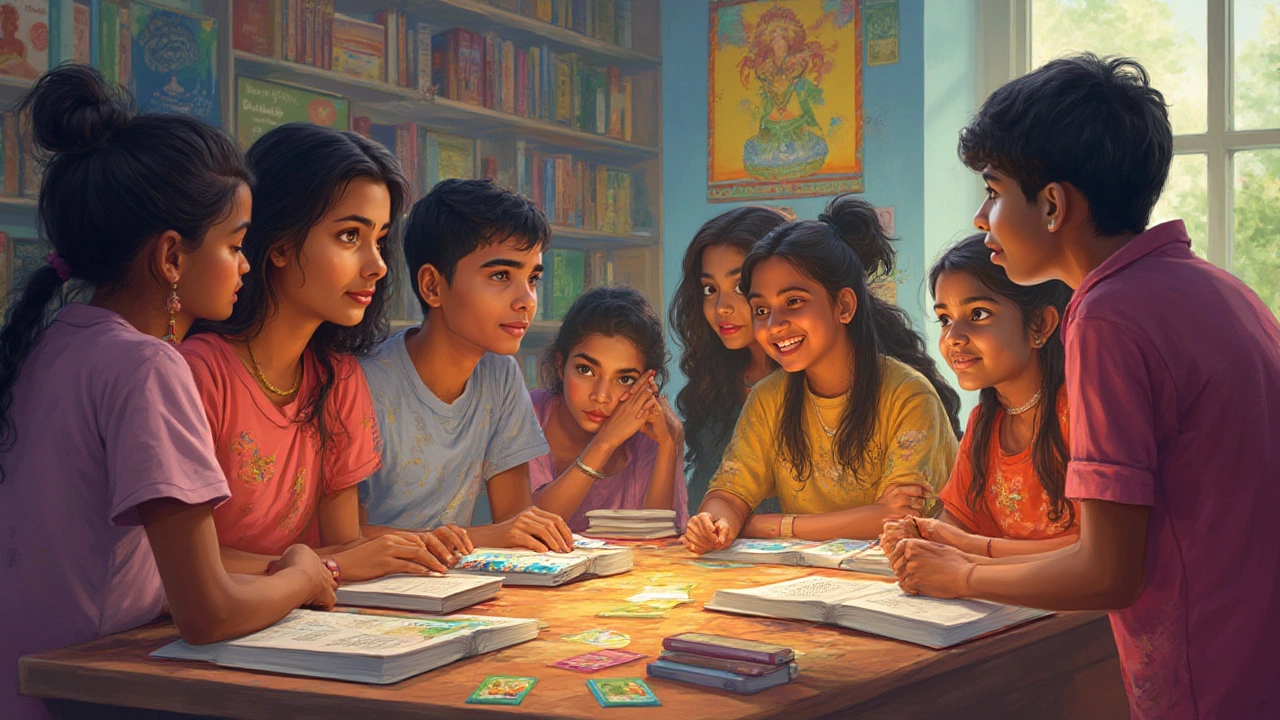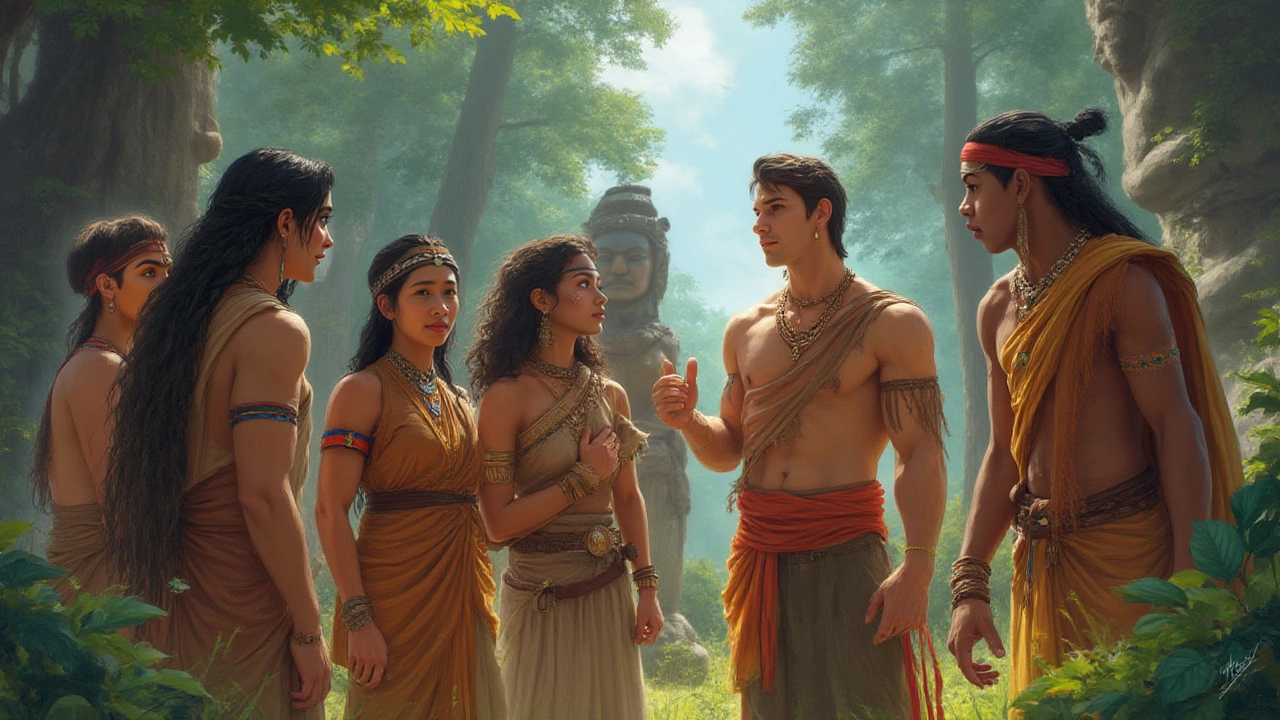Is Percy Jackson LGBTQ? Answers About Percy Jackson’s Sexuality and Identity
 Jul, 19 2025
Jul, 19 2025
If you’ve spent any time around a bookstore—or on TikTok—lately, you know that Percy Jackson and his fellow demigods are as popular today as they were nearly 20 years ago. But as more readers explore the series, there’s a question that keeps swirling on Reddit threads and Instagram reels: Is Percy Jackson LGBTQ? Let’s cut right through the speculation, internet whispers, and wishful thinking to get real about where Percy Jackson stands on the LGBTQ spectrum, how it all started, and what Rick Riordan himself has said about sexuality and representation in the world of Greek gods and monster-fighting teens.
Percy’s Sexuality: What Do the Books and Author Say?
This is the burning question—but the answer might surprise you with how simple it actually is. In the original "Percy Jackson & the Olympians" series, Percy Jackson is written as a straight, cisgender boy. Nowhere does he question his sexuality or express romantic or physical interest in anyone except for Annabeth Chase. Rick Riordan, the author, has spoken pretty directly about Percy’s romantic arc. In interviews, Riordan has confirmed that Percy and Annabeth are endgame—and in fact, their relationship is one of the central threads tying all five original books together. When fans have asked if Percy might be bi, pan, or otherwise queer, Riordan has politely shut down any speculation, emphasizing Percy's canon relationship with Annabeth.
But here’s something you might not know: Percy’s world, unlike many older fantasy series, is deliberately inclusive. Riordan’s newer characters and spinoffs bring LGBTQ voices front and center, but Percy himself, as originally written, is cis-het. This gets tricky for some readers who want their favorite hero to reflect their own experiences—but if you’re looking for representation, you just have to look at the other cabins at Camp Half-Blood. The books have become a welcoming space for LGBTQ fans because of the later heroes, not because Percy himself carries that label.
When the live-action Disney+ series was announced, there was fresh hope (and wild speculation) that producers might update Percy’s character to be more reflective of Gen Z’s more open approach to identity. So far, the announced scripts and cast info show Percy as the same Roman/Greek-inspired hero you remember from the books. Nothing official has shifted his sexuality from straight to queer—even in the 2023-2024 screen adaptation. But if Hollywood ever does take that leap, you can bet the fandom will have thoughts to share. Until then, the answer is clear as day in the books: Percy isn’t LGBTQ according to what’s on the page and what Riordan intended.
LGBTQ+ Representation in the Percy Jackson Universe
So, maybe Percy Jackson himself isn’t a queer icon by design, but that doesn’t mean the series hasn’t made huge waves when it comes to LGBTQ representation in young adult books. Riordan is famous for introducing characters in later books who are openly queer—and no, these aren’t blink-and-you-miss-it sidekicks. One of the biggest game-changers was in "The House of Hades" (2013), when Nico di Angelo revealed he had a crush on Percy. The fandom pretty much exploded, and for a good reason: this was one of the first major gay confessions by a main character in a blockbuster middle-grade fantasy.
Soon after, Riordan kept the momentum going. In the "Trials of Apollo" series, the main character—the god Apollo trapped in a teenager’s body—is canonically bi. That’s openly discussed, not just hinted at with vague phrases. And the spin-offs don’t stop there. Several campers at Camp Half-Blood are trans or gender-nonconforming. For example, Alexander and Halcyon Green from Camp Jupiter (the Roman demigod camp) make appearances as non-binary and genderfluid characters. Most notably, Riordan’s world is one where queer teens are celebrated and safe—something he’s said in interviews was missing from the books he read as a kid, and something he wanted to change for this generation.
The attention to real, honest, and sometimes awkward conversations about sexuality—like Nico coming out, grappling with internalized shame from his own upbringing, and the support he receives—makes the series stand out. Readers have written to Riordan by the thousands thanking him for making Nico, Apollo, and other characters’ experiences so visible. Some say it’s the first time they saw a hero who liked people of the same gender and it didn’t end in tragedy. Now, Riordan’s books are often recommended by teachers and librarians specifically for their diverse and sensitive portrayal of LGBTQ themes—and nearly every list of “Best Queer YA Books” has a Percy Jackson spin-off on it.
If you want to get specific, here’s a quick side-by-side of major LGBTQ characters across the series:
| Character | Identity | Book/Series |
|---|---|---|
| Nico di Angelo | Gay | Heroes of Olympus |
| Will Solace | Gay | Heroes of Olympus |
| Apollo (Lester Papadopoulos) | Bisexual (canon) | Trials of Apollo |
| Alex Fierro | Genderfluid, uses she/he pronouns | Magnus Chase and the Gods of Asgard |
| Piper McLean | Bi (suggested in later content) | Heroes of Olympus |

Why Fans Ask: The Power of Headcanons and Representation
But why do so many readers still wonder—is Percy Jackson LGBTQ, even if the text says no? That question takes us right into fan culture and the ways readers find themselves in stories. In today’s era of headcanons (where fans imagine backstories or identities for characters), fans use Tumblr, TikTok, and Reddit threads to swap ideas, art, and even alternate-universe (AU) stories where Percy, Annabeth, Grover, or others might be queer. This isn’t just about making things up for fun; for some readers, especially those who didn’t see themselves in mainstream fiction growing up, adopting "Percy as LGBTQ" helps them hold onto their favorite story and make it feel personal. It’s a comfort—like turning a found family into one of your own making.
BookTok and Instagram are full of alternate readings. Some fans analyze moments when Percy is emotionally supportive of Nico, his lifelong friendship with Grover, or his own awkwardness about fitting in. Others use these details as a springboard for exploration. Riordan himself is fine with this, as he’s said, “Once a book is out in the world, it belongs to the readers.” Still, he keeps a boundary: canonically, Percy isn’t LGBTQ. That doesn’t stop cosplayers and fan artists from shipping Percy with other male characters or dreaming up unique adventures where he discovers a different side of himself. Headcanons, fanfics, and alternative ships (short for “relationships”) keep this part of the fandom alive and why you’ll always see this question pop up again and again.
Representation matters, especially to teens and young adults searching for characters who reflect how they feel, love, or move through the world. For a lot of fans, even if Percy isn’t officially on the LGBTQ spectrum, Riordan’s universe is still a safe place to explore identity. Between Nico’s journey, Apollo’s openness, and queer and trans side characters living without fear, the books send a clear message: everyone, no matter who they are or who they love, can be a hero. That idea spills over—fans feel emboldened to celebrate or imagine whatever they want in these pages, and it fuels a community that is famously warm and inclusive.
Tips for Finding LGBTQ+ Heroes in the Percy Jackson Fandom
If you came here hoping for a proud, openly queer Percy, don’t feel let down. Here’s what you can do next to truly connect with LGBTQ stories in the Riordanverse and beyond:
- Explore the spinoffs. Read "Heroes of Olympus," "Trials of Apollo," and "Magnus Chase" to meet more diverse characters—Nico di Angelo, Will Solace, Alex Fierro, and Apollo himself. These series don’t shy away from tough conversations about identity.
- Check out fanfiction sites like Archive of Our Own, where LGBTQ versions of Percy and his friends get to star in their own stories. You’ll be amazed how creative the fandom gets—and how welcoming authors are to new readers.
- Join social media communities (like BookTok and Reddit’s r/PercyJackson), where fan art and headcanons give space for all identities. Ask questions—nobody here thinks it’s weird to imagine Camp Half-Blood with your own twist.
- Pay attention to Rick Riordan Presents, a publisher imprint for diverse voices in YA adventure lit. New authors from all backgrounds introduce myth-inspired heroes who are openly gay, trans, or non-binary.
- Share the books. If you’re a teacher, librarian, or older sibling, pass them on to the next generation. The impact goes way beyond the pages.
One more cool thing: Riordan regularly posts reading guides and author Q&As where he addresses inclusion, allyship, and the value in showing up for LGBTQ kids. If you follow his blog or social media, you’ll pick up tips for talking about sexuality in a supportive way—even if you’re not sure where to start.
So while Percy Jackson himself isn’t LGBTQ, he’s surrounded by friends, allies, and fans who are. If you want to see yourself—and your story—in a fantasy world full of monsters, quests, and gods who believe love is love, the door to Camp Half-Blood is wide open. Who knows? Maybe the next hero in line to wield that sword or solve the Oracle’s riddle will be just like you.